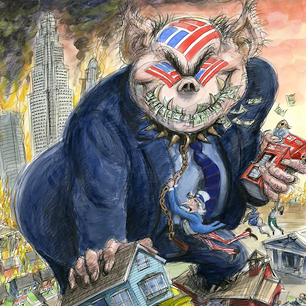Do you ever doubt your own ideas?
From an interview with MIT professor emeritus, Noam Chomsky, American linguist, philosopher, cognitive scientist, historian, logician, social critic, and political activist:
Q: Do you ever doubt your own ideas?
A: All the time. You should read what happens in linguistics. I keep changing what I said. Any person who is intellectually alive changes his ideas. If anyone at a university is teaching the same thing they were teaching five years ago, either the field is dead, or they haven't been thinking.
Q: How would you explain your large ambition?
A: I am driven by many things. I know what some of them are. The misery that people suffer and the misery for which I share responsibility. That is agonizing. We live in a free society, and privilege confers responsibility.
Q: If you feel so guilty, how can you justify living a bourgeois life and driving a nice car?
A: ... When I go to visit peasants in southern Colombia, they don't want me to give up my car. They want me to help them. Suppose I gave up material things -- my computer, my car and so on -- and went to live on a hill in Montana where I grew my own food. Would that help anyone? No.
Q: Have you considered leaving the United States permanently?
A: No. This is the best country in the world.
_____________________________
Today's competing demands for our attention leave little time for conscience, compassion, or conviction. Our social culture suggests we must first attend to our polarized politics and personal discontent. Today, those are the heart issues of mass media, and they are the common content of casual (if sometimes intense) conversation. Add to those the momentary spikes of interest in celebrities, sports, and meaningless memes. Perhaps none of those are legitimate issues of human existence.
A: I am driven by many things. I know what some of them are. The misery that people suffer and the misery for which I share responsibility. That is agonizing. We live in a free society, and privilege confers responsibility.
 |
| Normal life in Addis Ababa, Ethiopia; the capital city. I took this picture from the window of my nice hotel. Of course. |
A: ... When I go to visit peasants in southern Colombia, they don't want me to give up my car. They want me to help them. Suppose I gave up material things -- my computer, my car and so on -- and went to live on a hill in Montana where I grew my own food. Would that help anyone? No.
Q: Have you considered leaving the United States permanently?
A: No. This is the best country in the world.
_____________________________
Today's competing demands for our attention leave little time for conscience, compassion, or conviction. Our social culture suggests we must first attend to our polarized politics and personal discontent. Today, those are the heart issues of mass media, and they are the common content of casual (if sometimes intense) conversation. Add to those the momentary spikes of interest in celebrities, sports, and meaningless memes. Perhaps none of those are legitimate issues of human existence.
 Chomsky suggests that those of us who live in comparative ease, regardless of our how we arrived, carry a measure of responsibility in it all. Is he right?
Chomsky suggests that those of us who live in comparative ease, regardless of our how we arrived, carry a measure of responsibility in it all. Is he right?There are indeed so many opportunities to help, to make a way forward for others. and to offer hope.
*The second highest priority, we're told, is that we would do well by our fellow man. That we would do for them as we would for ourselves. Such a measure of justice and equality will change us and the world we touch. Mt.22:39.






























